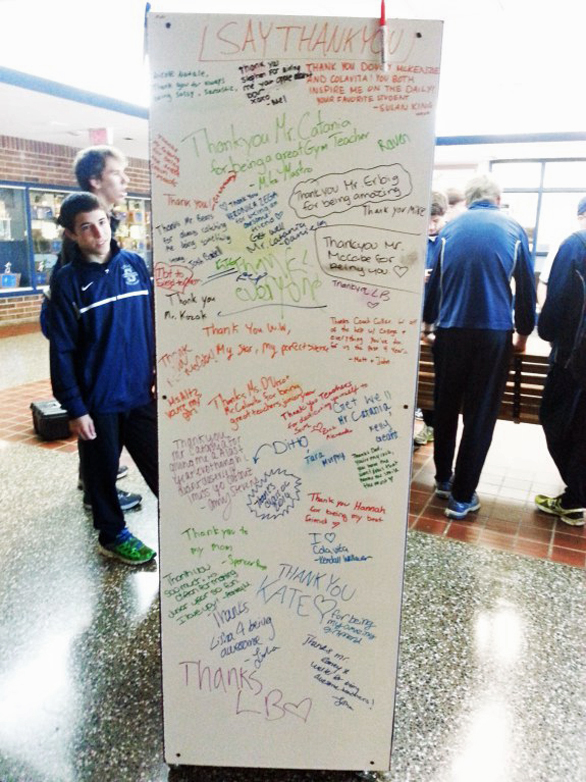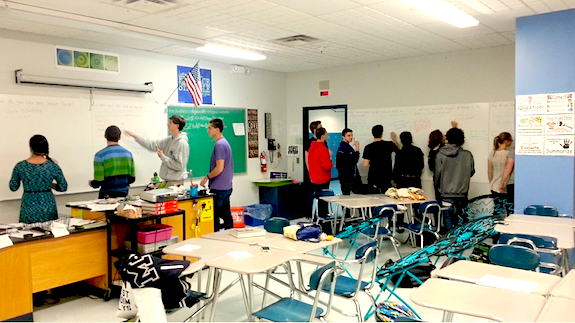
A TED-Ed Club builds a “thank you pillar” after watching Drew Dudley’s TED Talk.
A pillar stands in the main hallway of Middletown High School South in New Jersey, with a whiteboard on either side of it. In front of these boards, students line up and excitedly uncap markers to write, of all things, thank-yous. Some only write one or two words; others pen sprawling paragraphs. While so much high school news coverage focuses on bullying and putdowns, this busy hallway is full of students clamoring to thank their friends, teachers and even random acquaintances. This pillar was built by a group of students who’d participated in a TED-Ed Club.
The TED-Ed Club experience is about students discussing ideas and, eventually, learning how to give a TED-style talk about one they’re passionate about. But we’re also interested in the afterlife of those ideas: Do they inspire action? How do they impact others? When chemistry teacher Marc Seigel started a pilot TED-Ed Club at Middletown this summer, he and his students found themselves grappling with those same questions. In the end, the 40 students who participated in the club were inspired to get some of their big ideas out of the classroom and into the community.
Finding an opportunity to express
The club began by watching TED Talks. Member Sarah Maggipinto remembers, “On the first day, we go in and [Mr. Seigel] is like, ‘Okay. Here’s [a TED talk]. Watch it.’ And then he just said, ‘Okay. Now, talk.’ And in the first meeting, we didn’t know what to say. But by the second meeting, we were throwing ideas around; we were going off on tangents. We weren’t arguing with each other — we were just discussing the videos. We got into it, and it was really cool.”
Stephen Kalinoski, a senior, says, “I like being in a room where you’re free to say whatever you want and you’re not going to be judged. I feel like there’s a huge lack of that, in this day and age, especially in schools. If you say the wrong thing, you’re not considered ‘in this group’ or people look down on you. But in the TED-Ed Club, I can present my opinions, argue against other people’s points, maybe present my own idea, and everyone is supportive. Everyone understands. And even if we argue, it’s just out of the fun of challenging — it’s not out of ‘I think your opinion is stupid.’ It’s more like ‘That’s a very valid point, but let me bring up my idea.’ I love that sort of feeling.”
From dialogue to doing
As the club members got in the swing of debating, they found that they were itching to investigate how their insights might be useful to their larger school community. In response, they used their TED-Ed Club to launch three “community impact projects” inspired by some of their favorite talks. One of our favorite projects was inspired by Drew Dudley’s talk “Everyday leadership,” in which Drew articulates the importance of expressing gratitude to those people who impact our lives in seemingly simple ways. When the club members conceived of building the whiteboard pillars to collect their classmates’ thank you notes, they weren’t sure if many people would be interested in contributing. To their collective surprise, so many people were eager to share their gratitude that they had to build a second pillar the next day.
Maggipinto was thrilled by the reactions of her classmates. She recalls, “One girl read her name on the board, and she said, ‘I remember that! I said that to someone. I didn’t even realize it impacted them that much.’ It was a really cool experience to have and give other people.”
Even more community action
Drew Dudley’s talk also inspired a second action for the group — the students had an opportunity to express their gratitude more directly when they offered to clean the tables and sweep the floors for the cafeteria staff on the day before winter break. Seigel ran into one of the day custodians after the holidays. He recounted the experience in an email to his students, saying “[Charlie] wanted to thank all of you for helping clean the cafeterias on Friday. He said that when he was telling his family over the break what we did, it kept bringing a tear to his eye.”
The third community impact project was sparked by Candy Chang’s talk, “Before I die I want to…”. The students interpreted the talk as a call to strengthen their community. Noticing a lack of school spirit in some of the underclassmen in their school, the TED-Ed Club members were eager to boost morale and make sure that they, too, felt involved. In collaboration with a group of the school’s loudest and most spirited students who call themselves “MiddSouthNation,” they printed 3,000 stickers that said “I am… MiddSouthNation” and slapped them on every person they saw, from freshman to seniors, teachers to parents, cafeteria workers to bus drivers. The result? Member Mike Hopkins says, “It really brought the spirit up. We won our first game, and it just meant a lot more. After that, people kept coming back and enjoying it more.”
Good ideas can lead to any number of responses or actions. Next time you hear an idea that sparks your interest, try to imagine how you might apply it within your own community. If you’re interested in doing that within the context of a TED-Ed Club, be sure to apply here »
Find out more about the TED-Ed Clubs program »

The members of the Middletown TED-Ed Club excitedly brainstorm how they can make a difference in their community.
Comments (4)
Pingback: American Steroids Online